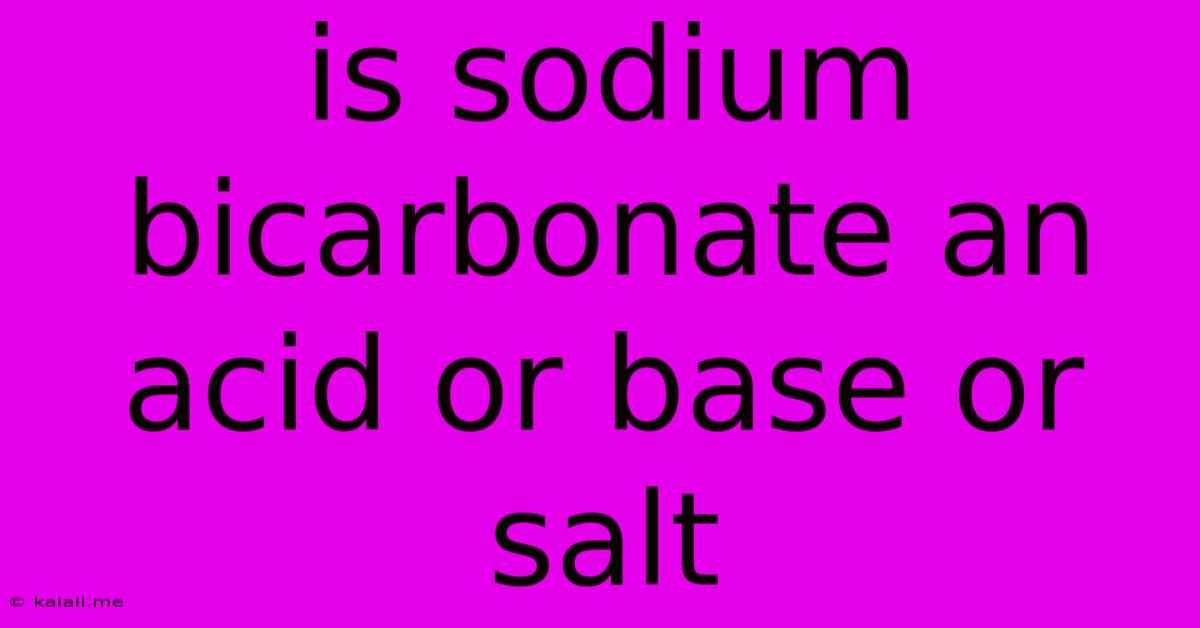Is Sodium Bicarbonate An Acid Or Base Or Salt
Kalali
May 28, 2025 · 3 min read

Table of Contents
Is Sodium Bicarbonate an Acid, a Base, or a Salt? Understanding its Chemistry
Sodium bicarbonate, also known as baking soda, is a common household item with a surprising amount of chemical complexity. Many wonder: is it an acid, a base, or a salt? The answer, as you'll see, is a bit more nuanced than a simple one-word response. This article will delve into the chemical properties of sodium bicarbonate to clarify its nature and its behavior in different contexts.
Understanding pH and the Acid-Base Spectrum
Before we classify sodium bicarbonate, let's briefly review the concept of pH. The pH scale measures the acidity or basicity of a solution. A pH of 7 is neutral, values below 7 are acidic, and values above 7 are basic (or alkaline). Substances can act as acids (donating protons, H⁺) or bases (accepting protons).
Sodium Bicarbonate's Chemical Structure and Properties
Sodium bicarbonate's chemical formula is NaHCO₃. It's an ionic compound formed from a sodium cation (Na⁺) and a bicarbonate anion (HCO₃⁻). This reveals its fundamental nature as a salt. Salts are formed from the reaction between an acid and a base. In this case, sodium bicarbonate is the product of a reaction between a strong base (sodium hydroxide, NaOH) and a weak acid (carbonic acid, H₂CO₃).
Amphoteric Nature: The Key to Understanding its Behavior
While fundamentally a salt, sodium bicarbonate displays amphoteric behavior. This means it can act as both an acid and a base, depending on the chemical environment.
-
Acting as a base: In the presence of a stronger acid, sodium bicarbonate acts as a base, accepting a proton (H⁺). This reaction is often used in baking, where it reacts with acidic ingredients to release carbon dioxide gas, causing the dough to rise. This is a neutralization reaction, where the base neutralizes the acid.
-
Acting as an acid: In the presence of a stronger base, sodium bicarbonate can act as an acid, donating a proton. This behavior is less common in everyday situations.
In Summary: A Salt with Amphoteric Properties
So, is sodium bicarbonate an acid, a base, or a salt? The most accurate answer is a salt with amphoteric properties. Its behavior is context-dependent. It's formed from an acid-base reaction, making it a salt. However, its ability to act as both an acid and a base in different situations demonstrates its amphoteric nature. This duality makes it a versatile compound with a wide range of applications, from baking and cleaning to medicine.
Practical Implications of its Amphoteric Nature
Understanding sodium bicarbonate's amphoteric nature is crucial for various applications:
- Baking: Its reaction with acidic ingredients is fundamental to baking.
- Antacids: Its ability to neutralize stomach acid makes it a common ingredient in antacids.
- Cleaning: Its mildly alkaline nature makes it effective at cleaning and deodorizing.
This detailed explanation provides a comprehensive understanding of the chemical nature of sodium bicarbonate, addressing the common question of whether it's an acid, base, or salt. Its amphoteric character and resulting versatile applications underscore its importance in various fields.
Latest Posts
Latest Posts
-
Best Moisture Barrier For Concrete Floor
May 29, 2025
-
What Is The Voltage In A Car Battery
May 29, 2025
-
Laying On Of Hands Bible Verses
May 29, 2025
-
Why Type C Headphones Cannot Connect To Mac
May 29, 2025
-
Is It Goodmorning Or Good Morning
May 29, 2025
Related Post
Thank you for visiting our website which covers about Is Sodium Bicarbonate An Acid Or Base Or Salt . We hope the information provided has been useful to you. Feel free to contact us if you have any questions or need further assistance. See you next time and don't miss to bookmark.